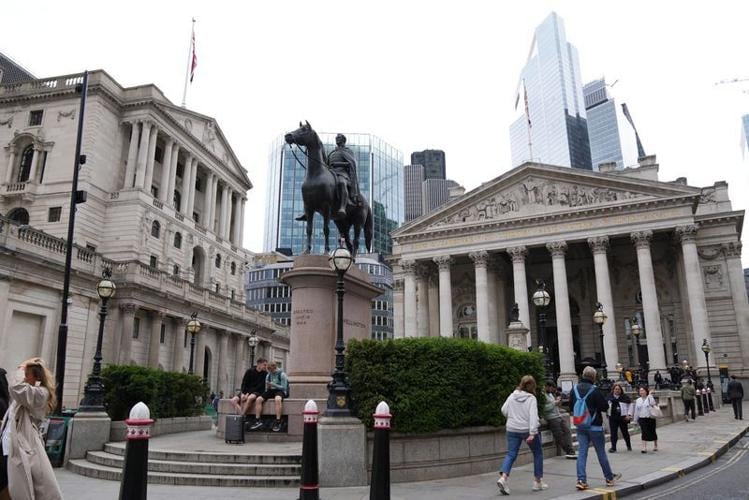
The Bank of England’s December rate decision caused more division than anticipated
Policymakers at the Bank of England divided on how to react to a slowing economy that is still struggling with inflation, and as a result, they voted 6-3 on Thursday to leave interest rates on hold, a wider difference than analysts had anticipated.
Alan Taylor, the newest member of the Monetary Policy Committee, and Deputy Governor Dave Ramsden unexpectedly joined veteran dove Swati Dhingra in voting to lower rates by a quarter point to 4.5%.
The U.S. Federal Reserve meeting on Wednesday prompted sterling to decline, and British government bonds to recover some of their losses as investors believed the BoE might lower interest rates a little sooner than initially anticipated.
The central bank must continue its current “gradual approach” to rate cuts, according to Governor Andrew Bailey, who voted with the majority to keep rates at 4.75%.
“With the heightened uncertainty in the economy we can’t commit to when or by how much we will cut rates in the coming year,” said the president.
Britain’s economy shrank in September and October for the first time since the COVID-19 epidemic, and the new government’s proposal of 25 billion pounds ($31 billion) in employer tax rises was largely to blame.
According to a Reuters survey conducted last week, the BoE is expected to lower interest rates four times in the upcoming year.
However, indications of persistent inflation pressures, such as faster-than-expected wage growth, caused financial markets to drastically lower their predictions on Tuesday.
After Fed Chair Jerome Powell stated that the U.S. central bank would need to exercise caution while lowering rates in 2025, those expectations suffered a further hit overnight.
Markets moved to price in 0.53 percentage points of rate cuts for 2025 following Thursday’s BoE news. This is much less than the 1.08 percentage points that the European Central Bank was forecast to reduce, but it is still up from its previous level of 0.46 percentage points.
According to Yael Selfin, chief economist at KPMG UK, “the difficult inflation backdrop will limit the MPC’s ability to ease interest rates next year.”
“This will put the BoE in a unique position relative to its counterparts in Europe, particularly the ECB, where a weakening growth outlook increases the urgency to cut rates,” she said.
Deutsche Bank senior UK economist Sanjay Raja predicted that the BoE would lower interest rates by a quarter point in February and then wait until the second half of 2025 to lower rates by an additional three quarters of a percentage point.
In February, financial markets factored in a 45% possibility of a quarter-point rate drop.
Bailey responded to reporters’ questions on market expectations by saying that while rate decreases were to be expected, it was unclear when they would occur.
That is evident in the pricing of the local market. According on the market, they may or may not make a cut in February. “That’s a fairly sensible place to start,” he remarked.
CUTS WITH SLOWER RATE
The BoE has already lowered rates by barely half a percentage point this year, showing less willingness to do so than the Fed or the ECB.
British consumer price inflation increased to 2.6% in November, according to official data released on Wednesday. This was somewhat higher than the BoE’s own prediction from the previous month and the highest among the Group of Seven wealthy economies.
“Headline inflation is expected to continue to rise slightly in the near term,” the Bank of England said.
But, just six weeks ago, it had lowered its growth estimate for the last quarter of 2024 from 0.3% to zero.
The BoE concludes that the budget proposed by Finance Minister Rachel Reeves on October 30 will have a short-term net growth benefit.
However, those MPC members who supported holding rates steady stated that it was still “particularly uncertain” if the consequences of increased employment taxes will result in slower wage growth and job losses or in higher prices being passed on to consumers.
It was also difficult to forecast how any changes to U.S. trade policy under incoming President Donald Trump would affect Britain, the BoE said.
“Recent developments added to the argument for a gradual approach to the withdrawal of policy restrictiveness, while eschewing any commitment to changing policy at a specific meeting,” stated five of the six members.
The BoE may need to use “an activist strategy,” according to the sixth MPC member who voted to keep rates on hold.
This phrase was originally used by MPC member Catherine Mann to describe her preferred strategy of holding rates steady until inflation pressures have evidently subsided before making more drastic rate cuts.
In the medium run, a “very restrictive” policy stance might push inflation too far below its 2% target and create an excessive amount of spare capacity in the economy, according to the three MPC members who voted to lower rates.
($1 = 0.7947 lbs.)
All Categories
Tags
+13162306000
zoneyetu@yahoo.com


